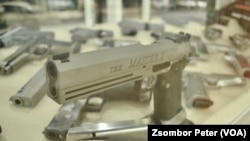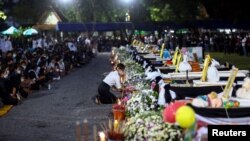One year ago Friday, a police officer who was recently fired for drug abuse stormed a nursery in northeast Thailand and proceeded to shoot and stab 36 people to death, including 24 children, before fatally shooting himself.
Panya Kamrab’s killing spree made for Thailand’s worst mass killing by a lone gunman on record. It set off a wave of calls for tougher firearms laws in a country with the highest rate of gun ownership in the region. Then-Prime Minister Prayuth Chan-ocha convened a special meeting of top officials to brainstorm ideas and promised action.
A year later, however, none of the laws and regulations governing who can buy, sell or own a gun in Thailand has changed.
"At this moment, [there has been] no ... change in the laws and regulations," Chavanut Janekarn, a criminologist at Thailand’s Thammasat University and retired 25-year veteran of the police force, told VOA.
"It’s the same," he said of the rules for buying and owning a gun. "It’s still easy."
Gun dealers in Bangkok's Wang Burapha neighborhood, the epicenter of the capital’s retail firearms trade, echoed the point.
They told VOA the government has been applying existing laws more strictly but has not changed them.
"The rules [are] the same because the rules never changed," said Thititorn Bupparamanee, president of the Firearms Traders Association of Thailand and a Wang Burapha gun shop owner.
Proposed reforms from the police following last year’s tragedy included adding psychological evaluations to the application process and having gun owners periodically reassessed, and a chance for unlicensed gun owners to turn their weapons in without being prosecuted. The police also announced plans to freeze a "welfare guns" program that allows officers, soldiers and many other government officials to purchase guns at steep discounts.
A spokesperson for the government that took office last month following national elections in May confirmed to VOA this week that none of the reforms came to pass but conceded that his own administration has not prioritized gun reform either.
Chai Watcharong said that changed Tuesday after another shooting shocked the nation. That afternoon, police say, a 14-year-old boy shot and killed two people and wounded five in one of Bangkok's premier shopping malls with a pistol designed to shoot blanks but which had been modified to fire live rounds.
Naming the problem
In the days since, authorities have proposed a raft of reforms, from reclassifying guns that shoot blanks as lethal weapons to an immediate and indefinite freeze on all new gun permits.
Interior Minister Anutin Charnvirakul told reporters he would review the country's gun laws for possible amendments but offered no details.
Industry experts are skeptical that real, lasting changes are on the way.
"The gun business sector is very large in Thailand and there are lots of gun dealers that have close connections to the government or to the Ministry of Interior or to the police and to the military. So, in my opinion, I think it's quite difficult to propose any policy that disrupts the gun business in Thailand," Chavanut said.
That business has given Thailand the highest rate of gun ownership in Southeast Asia, with some 6 million registered firearms in civilian hands in a country of 71 million. GunPolicy.org, a project of the University of Sydney, listed another 4 million unregistered guns in 2017 and 1.2 million in 2021, citing different sources, though both may be vast undercounts.
"For most countries like Thailand — similar level of wealth, not an island country — we expect unregistered guns to be two to three times the total number of registered; that would be very common," said Aaron Karp, a senior consultant for the Geneva-based Small Arms Survey.
Conservatively, that would mean at least 18 million civilian guns in Thailand, or roughly one for every four people.
Government figures also show gun-related crime surging, from about 24,000 cases in 2018 to over 87,000 last year.
Most of the reforms authorities have proposed over the past year have been little more than "window dressing" or miss the root causes, says Michael Picard, a consultant for HALO Trust and Transparency International on the small arms trade. He says real change will take a fundamental shift in thinking.
"It's not so much the Thai gun laws that have to change, in the sense of the laws that govern civilian weapons and civilian-owned weapons. It's really internal, it’s the institutions themselves that don’t really ... want to reform their firearms regulations," he said.
Searching for answers
Perhaps the best thing the government could do, Picard said, is to scrap the welfare guns program altogether and have the state supply the security forces with all the weapons they need to do their jobs, as most countries do.
“It’s just an easy way for underpaid police officers to make a buck,” he said of the program. “They pay 60% of what they normally would if they were just buying a firearm through the legal civilian market, and then they can easily go and sell that online or to whoever and supplement their income.”
Chavanut agreed that the program has provided freelance gun traders with a back door to the black market. He advised the government to at least rein it in, and to follow through on the idea of demanding a clean bill of mental health from anyone applying for a gun permit.
The government has not floated either idea since Tuesday’s mall shooting, and Bangkok’s firearms dealers are wary of both. They say Thailand needs the welfare guns program to keep its police well-armed, and that any mental health tests would prove flimsy.
"Anyone’s mental state can change at any time, and they can trick the psychologists," said one shop owner, who asked to remain anonymous. "Give it a try, I guess ... but I’m not sure it would actually work."
They say the laws are as tough as they need to be and that the authorities just must do a better job of catching those trying to get around them.
"The law can control only the people who [have] respect for the law and the law cannot control ... the bad guy to have illegal guns; they still can [get] the illegal gun from the black market," the trade association’s Thititorn said.
"If they have more controls [on] the good guy to buy the gun, then sometimes the good guys don’t have the guns to protect themselves."





